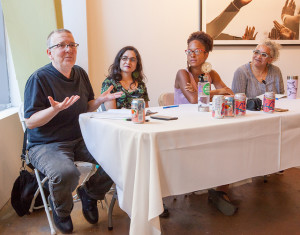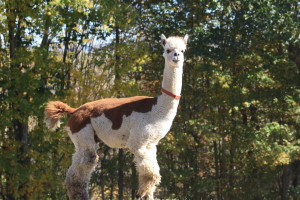Earlier this month, San Francisco Women Against Rape presented a program entitled “Last Night a Pigeon Changed My Life: Confronting the Inescapable Connections Among Violence Against Women, Ableism, and Speciesism.” Introduced by Janelle White of SFWAR, who spoke of the life-changing event of rescuing a pigeon while noticing the dismissive attitudes of some of her social justice comrades toward that bird, the discussion panel included Breeze Harper of the Sistah Vegan Project, lauren Ornelas of the Food Empowerment Project, and pattrice jones (that’s me), representing VINE Sanctuary. (Photos by Pax Ahimsa Gethen here.) The event was recorded, and a video will be forthcoming, but I’ve seen some questions about the ableism connection on social media, so I thought it might be helpful to share some of what I said about that along with some sources of further information.
People who bother to justify their presumed right to exploit, cage, kill, and control the reproduction of nonhuman animals tend to reach for a limited number of arguments. Among the most common of these is the idea that only humans have some particular capability and that this superiority of ability entitles people to do whatever they like to nonhuman animals. As I once heard disability rights activist Mary Fantaske say, “That’s not just like ableism; that is ableism.”
Consciousness, sense of self, tool use, language… all of these and more have been put forward as abilities that both demonstrate human superiority and justify human hegemony. Let us set aside for a moment the fact that many other-than-human animals do, in fact, have the capabilities claimed to be solely the province of humans. (Crows and monkeys make tools; elephants and scrub jays demonstrate sense of self; birds and bees both communicate via complex conjugations of signals; and even birds, not to mention all mammals, share with us the basic brain architecture responsible for consciousness.) Let us also set aside the fact that many animals have abilities we do not possess. Instead let’s focus on the structure of the argument: We have X ability; therefore we are superior to and may do whatever we like to those who do not have that ability.
That is a dangerous way of thinking. People with disabilities have been locked up for life, involuntarily sterilized, experimented upon without consent, made to work without pay, deprived of civil rights, and subjected to many other painful indignities due to that way of thinking. To take just one example, the notion that sign language wasn’t really language and that therefore Deaf people were subhuman led directly to the break-up of Deaf families, the forcible sterilization of Deaf people, incarceration and enslavement of Deaf youth, and many other abuses that shock the conscience of those who learn that history for the first time. (If you don’t know that history, or the history of Deaf resistance to that tyranny, I suggest you begin with the anthology Deaf World edited by Lois Bragg.)
This example not only illustrates the ableism inherent in capability-based defenses of human supremacy but also highlights the hazard of defining “human” by means of a particular ability. That brings us to the ability most commonly claimed as the reason for human superiority and the rationale for human supremacy: rationality.
Homo Sapiens means, literally, “wise man” with the sapiens meant to distinguish our species from allegedly less intelligent members of genus homo. Apart from the hubris of thinking of ourselves as the smartest of all, this designation centers cognitive capability as the very definition of humanity.
In coming up with this name for our species, Carl Linnaeus hearkened back to Aristotle, who called “man” (and he did mean man) the “rational animal.” Ecofeminists have long identified the elevation of reason over emotion as one of the factors in a worldview that elevates males and humanity over women and nature; similarly, some critical race theorists have shown how whiteness is built into modern conceptions of the human. At the everyday level, sexist men often presume themselves to be more rational and less emotional than women, who also are dehumanized in other ways; racist whites claim to be inherently more intelligent than people of color, who are also dehumanized in other ways. And so, this definition of “human” by means of presumed superiority of our cognitive abilities not only facilitates subordination of animals and discrimination against people with disabilities but also factors into allegedly “other” forms of oppression such as racism and sexism.
As I will be discussing thoroughly in my next book, tentatively entitled Human Error, speciesism not only skews our views of nonhuman animals but also distorts our sense of ourselves, in ways that can make it difficult for us to solve problems like climate change and gun violence. Any vegan who has been locked into never-ending arguments with meat eaters who will not relent no matter how many times their own logical inconsistencies are pointed out to them has fallen for the speciesist fallacy of human rationality. If we really want to undermine human supremacy, we will have to work within a more realistic model of what motivates human behavior, and that will require rethinking what it is we mean by “human.”
Meantime, here are some sources of more information and ideas about the links between ableism and speciesism:
- The Oxen at the Intersection by pattrice jones — This book about the unsuccessful struggle to save two oxen after one of them became disabled includes a chapter entitled “Disability Rites” within a larger section entitled “Dangerous Intersections” and is intended to be a case study of how to think ecologically about animal advocacy.
- Beasts of Burden by Sunaura Taylor — Part memoir and part scholarly inquiry, this book by a disabled artist and activist challenges both animal rights activists and disability rights activists to wrestle with
- Mary Fantaske on Intersections Between Ableism & Speciesism (video) — This brief presentation from the 2013 Human Rights Are Animal Rights conference in Guelph 2013 covers several key ideas.
- Aphroism by Aph Ko and Syl Ko — This collection of blog posts by two Black vegans doesn’t address disability directly but does provide an accessible introduction to anti-racist challenges to the concept of the human.
But, wait, I have one more thing to say, or rather to disclose. In the course of the panel discussion, I mentioned Domino, a neuro-atypical alpaca whose disability seems to be related to his ability to extend friendship and care to sanctuary residents of other species, most notably a previously lonely pig called Val and a traumatized young ewe called Shadow.
He’s not the only neuro-divergent member of our multi-species community. I am another. As I mentioned at the event, VINE co-founder Miriam Jones and I met in the context of a disability rights struggle. Our paid staff and core volunteers include many people with disabilities. In recent years, we’ve made a point of identifying ourselves as an LGBTQ-led organization, and yet we have not been so forthcoming about being an animal sanctuary staffed in part by people with disabilities. Why? Could it be because most of our disabilities are not in the realm of mobility but rather in the presumably irrational realm of the psyche?
I can only speak for myself. I am not only neuro-atypical but also have a significant mental health diagnosis as well as persistent problems with memory possibly rooted in early traumatic brain injury. I worry even as I type this that disclosing these things will lead me to be stereotyped in ways that will inhibit my ability to be an effective advocate for animals. But I think I’m going to go ahead and “come out” because we really do need to challenge the ableist ideas built into speciesism, starting with the fallacy that “normal” humans are primarily rational animals.






The Oxen at the Intersection is an indispensable book that also lifts the legacy of Bill and Lou.
much love for you and all at Vine
I am really grateful for you coming out in this way. I think discussions of health and ability are obviously lacking in animal lib movements for reasons discussed here. But even further- I think many in animal movements develop mental health struggles due to what we are exposed to. I am doing more work in trauma therapy for things I’ve witnessed in animal rescues than for actual assaults on my body. A culture that teaches us to put animals first, that we are poor advocates if we admit weakness, etc is what causes people to burn out by age 25. You’re still going and have created this amazing sanctuary and put out literature that I and others have longed for and people can learn so much from this. So, I’m sorry for writing so much I just want you to know this brought tears to my eyes and really meant a lot to me as a chronically ill and disabled QT person who feels very alone and even useless much of the time.
So, any time you’re feeling anxious for being vulnerable, or if you get any pushback, please know how important it was to many of us to know these things about you and vine. I can’t wait for the new book!
I have recently launched a platform to address the specific interconnections between speciesism and ableism: Crip HumAnimal
https://criphumanimal.org/